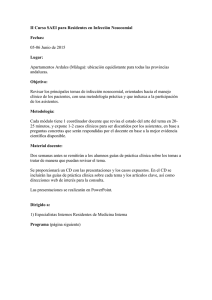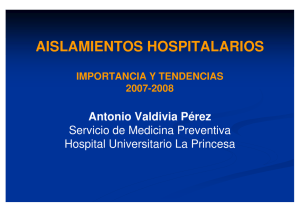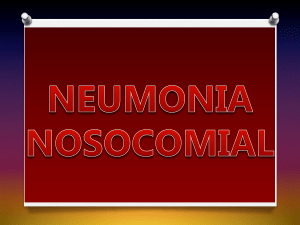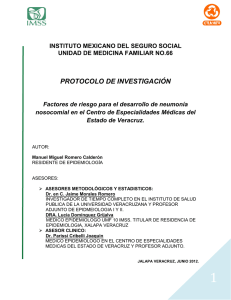publisher Universidad del Rosario type info:eu-repo/semantics/publishedVersion
Anuncio
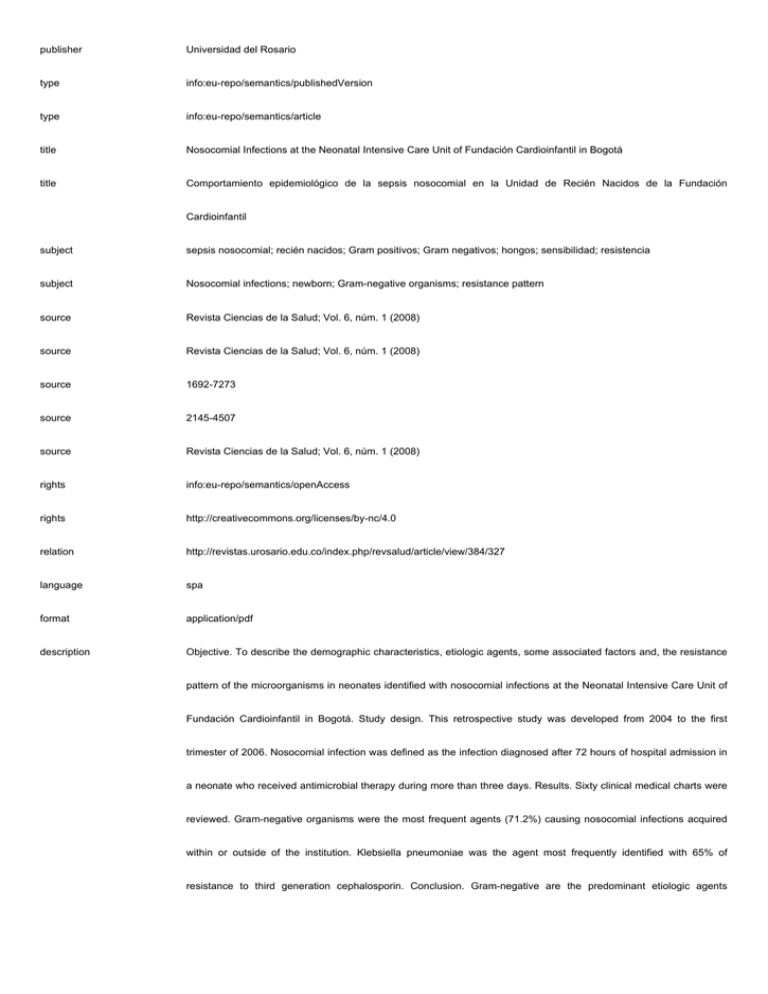
publisher Universidad del Rosario type info:eu-repo/semantics/publishedVersion type info:eu-repo/semantics/article title Nosocomial Infections at the Neonatal Intensive Care Unit of Fundación Cardioinfantil in Bogotá title Comportamiento epidemiológico de la sepsis nosocomial en la Unidad de Recién Nacidos de la Fundación Cardioinfantil subject sepsis nosocomial; recién nacidos; Gram positivos; Gram negativos; hongos; sensibilidad; resistencia subject Nosocomial infections; newborn; Gram-negative organisms; resistance pattern source Revista Ciencias de la Salud; Vol. 6, núm. 1 (2008) source Revista Ciencias de la Salud; Vol. 6, núm. 1 (2008) source 1692-7273 source 2145-4507 source Revista Ciencias de la Salud; Vol. 6, núm. 1 (2008) rights info:eu-repo/semantics/openAccess rights http://creativecommons.org/licenses/by-nc/4.0 relation http://revistas.urosario.edu.co/index.php/revsalud/article/view/384/327 language spa format application/pdf description Objective. To describe the demographic characteristics, etiologic agents, some associated factors and, the resistance pattern of the microorganisms in neonates identified with nosocomial infections at the Neonatal Intensive Care Unit of Fundación Cardioinfantil in Bogotá. Study design. This retrospective study was developed from 2004 to the first trimester of 2006. Nosocomial infection was defined as the infection diagnosed after 72 hours of hospital admission in a neonate who received antimicrobial therapy during more than three days. Results. Sixty clinical medical charts were reviewed. Gram-negative organisms were the most frequent agents (71.2%) causing nosocomial infections acquired within or outside of the institution. Klebsiella pneumoniae was the agent most frequently identified with 65% of resistance to third generation cephalosporin. Conclusion. Gram-negative are the predominant etiologic agents responsible of nosocomial infections in neonates admitted to the Fundación Cardioinfantil. description Objetivo. Se realizó un estudio retrospectivo que describe las características demográficas, la etiología, los factores asociados, la mortalidad, la sensibilidad y la resistencia de los microorganismos a los antibióticos usados en sepsis nosocomial. Diseño del estudio. Se realizó la recolección de datos desde el 2004 hasta el primer trimestre del 2006. Se definió infección nosocomial probada como la infección diagnosticada después de 72 horas de hospitalización y que recibe manejo antibiótico mayor a 3 días. Resultados. Se revisaron 60 historias clínicas, en las cuales los gérmenes Gram negativos fueron los principales causantes de sepsis nosocomial, tanto intra como extrainstitucional; de ellos la k. pneumoniae fue el germen más frecuentemente encontrado. Conclusiones. Los gérmenes Gram negativos son los microorganismos predominantemente causantes de sepsis nosocomial en la Unidad de Recién Nacidos (URN) de la Fundación Cardioinfantil (FCI). identifier.uri http://hdl.handle.net/10336/7416 identifier http://revistas.urosario.edu.co/index.php/revsalud/article/view/384 date.available 2014-07-09T15:55:59Z date.accessioned 2014-07-09T15:55:59Z date 2010-05-12 creator Troncoso, Gloria creator Eraso, Jenny creator Álvarez, Marta creator Ibáñez, Milcíades
